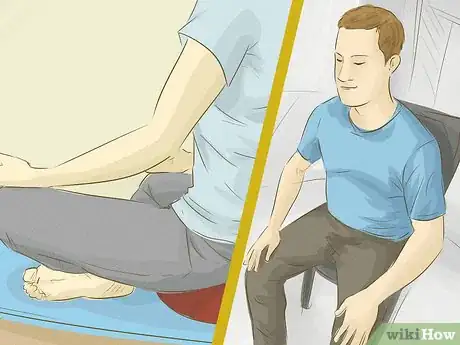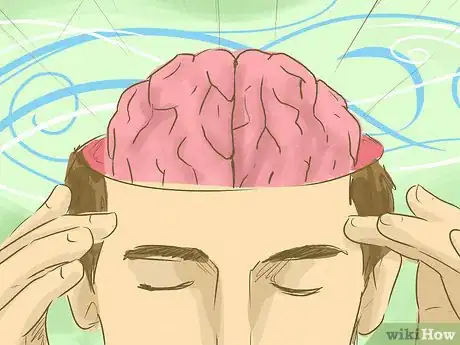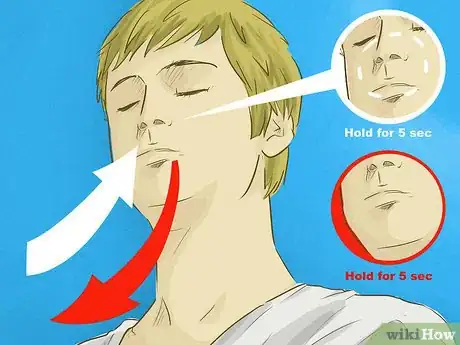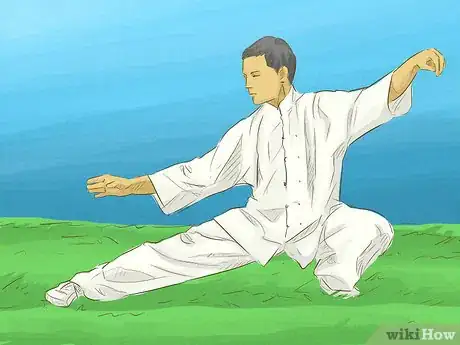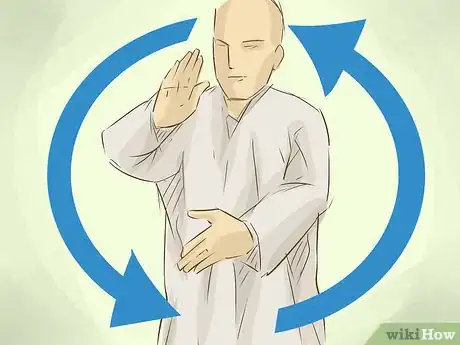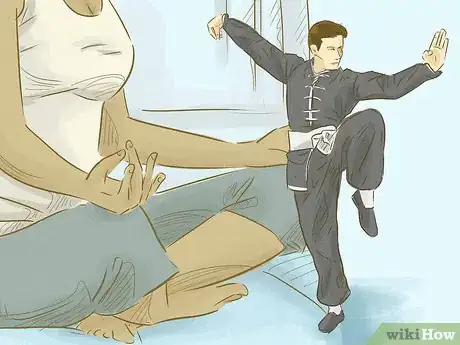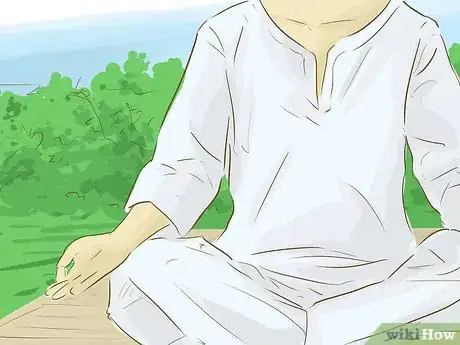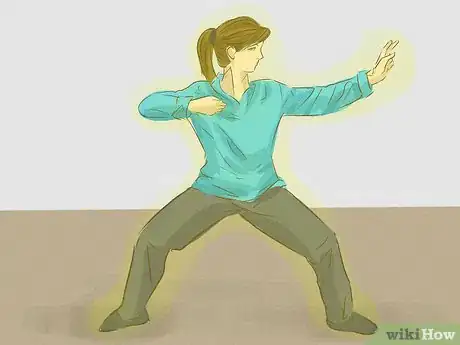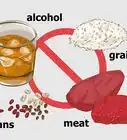This article was co-authored by Frank Blaney. Frank Blaney is a Certified Qigong and Tai Chi Instructor with over 15 years of teaching experience. Passionate about making Qigong more accessible to people, Frank is the author of "Qigong: The Quick & Easy Start-Up Guide." He also holds a 2nd Degree Black Belt in Jujitsu and trains executives and staff of corporations, NGOs, and communities in self-care, personal performance and conflict resolution. He holds an MA in Negotiation, Conflict Resolution, and Peacebuilding from California State University Dominguez Hills.
There are 8 references cited in this article, which can be found at the bottom of the page.
wikiHow marks an article as reader-approved once it receives enough positive feedback. This article received 40 testimonials and 94% of readers who voted found it helpful, earning it our reader-approved status.
This article has been viewed 965,920 times.
The Chinese word “chi” or “ch’i” can be defined as life force or energy, and has parallels in other cultures: “prana” in India or “qi” in Japan. Developing your chi can be a way to heal your body – both physically and mentally – as well as a path to reaching your full potential. To fully realize your life force, you have to develop your breath and physical practice, and then approach the development of your chi on the level of energy and spirituality.[1]
Steps
Developing Your Chi Through Breath Work
-
1Get comfortable. To properly work on your breathing, it needs to be your main focus – not on how uncomfortable your legs are, or how you want to hang a picture on the wall you’re staring at. Choose between a chair and a pillow on the floor – whichever would be most comfortable is the best choice.
- In a chair, sit with your back straight, your feet flat on the ground, and knees shoulder width apart.
- On the floor, choose either a cross-legged position or kneeling.
-
2Breathe deeply.[2] Pay attention to breathing in and out. Make sure you are using your diaphragm, not just your chest. Breathing from your diaphragm (lower in your body, close to your stomach) allows you to get more air both in and out. Cycling a lot of air through your body is essential to developing your chi. Keep doing this exercise over the course of days and weeks until it becomes natural. Then you can begin to attempt this style of breathing wherever you might be to help get your energy flowing.[3]Advertisement
-
3Keep your mind empty. It’s difficult to keep your mind neutral and away from thinking about anything and everything. But for the 5-10 minutes that you are practicing breathing, try to just focus on that. The in and the out are like the yin and yang – opposites, yet interconnected.
-
4Try breathing in a square. Not actually breathing in the physical shape, breathing in a square is for after you have mastered the basic breathing from the diaphragm. Put yourself into your comfortable seated position to begin. To breathe in a square:[4]
- Breathe in
- Hold your breath for 5 seconds
- Breathe out
- Hold your breath for 5 seconds
Developing Your Chi Physically
-
1Practice Tai Chi. The art of Tai Chi is specifically designed to help you balance your chi. Though there are many moves that make up Tai Chi, you can begin with a few of the basics to see how they work. Breath is central to Tai Chi, and hopefully you have already developed a good sense of how breath and chi work together from the previous step. The practice of Tai Chi itself is essentially a slow and gentle series of movements that are designed to ground you and get you in touch with your breath and chi. Within Tai Chi, there are different schools that have slightly different ways of doing the forms, or steps, within the practice. If you’re interested, Tai Chi courses are often offered at yoga studios and community centers. Check your local martial arts studio as well – they might know about classes.[5]
-
2Develop your stance.[6] The Wuji or horse stance is the basis of Tai Chi. It may look like you’re just standing there, but it’s a great way of getting in touch with your energy. Just by standing in horse stance and breathing, you can develop your chi.
- Your feet should be parallel, shoulder width apart.
- Make sure that your weight is in the middle of your feet.
- Move your torso so that you are standing as if sitting up straight in a chair.
- Bend your knees.
- Let your spine feel as if it’s floating upward.
- Relax your shoulders.
- Gently touch your tongue to the roof of your mouth.
- Breathe naturally.
-
3Practice arm work. This is an exercise, not part of an actual Tai Chi form, but can help you get in touch with your body. It can also help you in trying to develop chi throughout your body while you’re moving, keeping track of your breath.[7]
- Put your right hand, palm out, parallel and in front of your face.
- Place your left hand, palm in, parallel and in front of your stomach.
- Slowly move your arms in circles.
- Your arms will be going around each other and your palms will be at different angles, depending upon where in the circle they are. They go from being facing completely in and out at the top and bottom of the circle to being flat when they are parallel to you in front of your chest.
- Breathe.
-
4Find the form of energy training that works best for you. Tai Chi is not the only physical form that helps to develop your chi. If you believe that it is too slow and meditative, you might be more interested in kung fu, which was also developed to help your chi, or yoga, which is from the Indian tradition and is also aimed at fully realizing your life force.[8]
Focusing on the Energy and Mental Level of Chi
-
1Explore chi kung (qigong). Beyond the physical level – the breathing and the movements that help you get in touch with your chi – truly developing your chi will take moving it to the mental and spiritual level. Chi kung is a disparate group of practices from different civilizations that are aimed at bringing your mind to a higher level of consciousness and unleashing the true power of your life force.
-
2Focus on your energy. This will help to bring you to the next level of chi. As you do your breathing and exercise of choice, focus on areas of your body where the energy is not flowing.[9] These are energy blockages, and each one will require focus and determination to fix it and get the energy flowing as it should. Some people are able to get their energy moving by themselves through breathing and physical practice, but many of us need help and guidance when practicing energy work. One easy way to find out how your body energy is functioning is to take the diagnostic test below, which can help you identify the elements present in your body, and which are lacking and need to be remedied. For the assistance of a licensed Qigong practitioner, who will be able to help you to higher levels in your energy work, consult the website below.[10]
-
3Work on the body/mind/soul connection. This is moving to the highest level of chi. It will encompass all of the work you have done so far – breath, physical movement, energy flow – and add the spiritual element. This will lead you to a state of mindfulness or focused awareness. Similar to the Zen practice of Buddhists, the spiritual aspect of developing your chi can be a lifelong pursuit. We might be able to achieve the state we are seeking one day, but the next cannot come near it. To truly realize this spiritual connection along with the physical and energy aspects, you must be fully grounded in the present moment and completely aware – it’s not about going to some different plane of consciousness. For most people, meditation is the best way of reaching this highest level of chi development.[11]
Expert Q&A
-
QuestionHow do you practice chi energy?
 Frank BlaneyFrank Blaney is a Certified Qigong and Tai Chi Instructor with over 15 years of teaching experience. Passionate about making Qigong more accessible to people, Frank is the author of "Qigong: The Quick & Easy Start-Up Guide." He also holds a 2nd Degree Black Belt in Jujitsu and trains executives and staff of corporations, NGOs, and communities in self-care, personal performance and conflict resolution. He holds an MA in Negotiation, Conflict Resolution, and Peacebuilding from California State University Dominguez Hills.
Frank BlaneyFrank Blaney is a Certified Qigong and Tai Chi Instructor with over 15 years of teaching experience. Passionate about making Qigong more accessible to people, Frank is the author of "Qigong: The Quick & Easy Start-Up Guide." He also holds a 2nd Degree Black Belt in Jujitsu and trains executives and staff of corporations, NGOs, and communities in self-care, personal performance and conflict resolution. He holds an MA in Negotiation, Conflict Resolution, and Peacebuilding from California State University Dominguez Hills.
Certified Tai Chi & Qigong Instructor Focus on your energy to help increase your chi. For instance, you might breathe in and focus on sending your chi to places in your body where the energy is low.
Focus on your energy to help increase your chi. For instance, you might breathe in and focus on sending your chi to places in your body where the energy is low. -
QuestionWhat is it helpful for?
 Community AnswerIt can help with healing and self-actualization.
Community AnswerIt can help with healing and self-actualization. -
QuestionCan I fly using Chi energy?
 Community AnswerProbably not. Chi is more of a Life Energy. Of course, if you believe in Chi and train, surprising things are possible.
Community AnswerProbably not. Chi is more of a Life Energy. Of course, if you believe in Chi and train, surprising things are possible.
References
- ↑ Frank Blaney. Certified Tai Chi & Qigong Instructor. Expert Interview. 19 May 2020.
- ↑ Frank Blaney. Certified Tai Chi & Qigong Instructor. Expert Interview. 19 May 2020.
- ↑ http://www.ryansden.com/hmsk.html
- ↑ http://www.qienergyexercises.com/qi-breathing-4-breathe-in-a-square.htm
- ↑ http://www.mayoclinic.org/healthy-lifestyle/stress-management/in-depth/tai-chi/art-20045184
- ↑ Frank Blaney. Certified Tai Chi & Qigong Instructor. Expert Interview. 19 May 2020.
- ↑ http://www.taichi17.com/foundation-exercises/
- ↑ http://www.energyarts.com/faq/tai-chi/how-do-yoga-and-tai-chi-compare
- ↑ Frank Blaney. Certified Tai Chi & Qigong Instructor. Expert Interview. 19 May 2020.
About This Article
To develop your chi, spend 5-10 minutes focusing on nothing but your breathing. Sit comfortably in a chair or cross-legged on the floor, then breathe in deeply from your diaphragm. You should feel the breath expand your stomach. Hold that breath for about 5 seconds, then exhale completely. Hold your breath for another 5 seconds, then inhale again. As you’re doing this, try to clear your mind of any other thoughts. Do this once a day for several days or weeks to keep your chi flowing. Keep reading to learn how to use Tai Chi to develop your chi!

